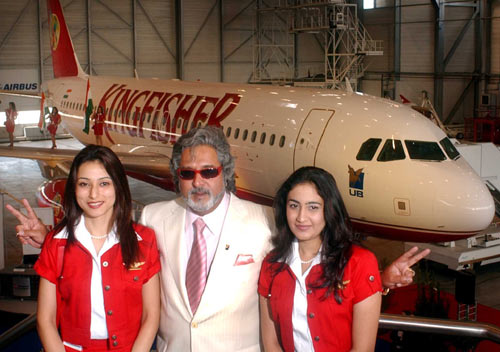
Mumbai, Feb 19: A week after its lenders decided to recover their dues, cash-strapped Kingfisher Airlines has started paying salaries to its employees apart from approaching the aviation regulator seeking licence renewal, sources said today.
"Some of us have received salary dues. Those in the lowest package as well as some engineers and pilots have also a month's salary dues," sources told PTI.
The airline has not been paying salary to its employees since May last year, while it had started delaying salaries much before the crisis broke out last October. The sources also said airline Chief Executive Sanjay Agarwal is in the capital to meet the Directorate General of Civil Aviation (DGCA) to make a fresh request to resume operations. However, both the developments could not be officially confirmed.
Earlier in the day, Kingfisher shares rose as much as 5 per cent on the BSE, the maximum permissible limit on a day, after one of its promoters, United Breweries Holdings, hiked its loan limit for the ailing carrier to Rs 750 crore from Rs 300 crore.
UB Holdings has sought approval from its shareholders to revise the lending limit for Kingfisher and to authorise its board of directors to take necessary actions in this regard, the company had said yesterday.
Reacting to the development, shares of the company touched an intra-day high of Rs 10.53 on the BSE, higher by 5 per cent from its previous closing price at 1230 hours.
"To accommodate further lending to Kingfisher if required, it is proposed to realign these limits further by increasing the lending limit to KFA from Rs 300 crore to Rs 750 crore and reducing the investment limit from Rs 1,200 crore to Rs 750 crore, thus maintaining the overall limit of Rs 1,500 crore..," UB Holdings said in a shareholders' notice.
The revision was done to facilitate the conversion of loans given to Kingfisher into convertible/no-convertible securities, as required by the debt recast agreement between the airline and a consortium of its lenders.
It can also be noted that last Tuesday, the lenders to the airline, which number as many as 17 banks which together had extended Rs 7,000 crore to the company, had resolved to recall their loans to the airline, which had been grounded since October one last, saying more than enough time was given to the management to revive the crippled airline.
The lenders consortium leader State Bank, which has an outstanding dud loan of over Rs 1,700 crore, had said as a first step, lenders would monetise the collaterals given to them from other group companies like Mangalore Fertilisers and the flagship United Spirits, in which 54 per cent has been sold to the British spirits major Diageo for around Rs 11,170 crore.
However, the UB Group has denied that it had given USL shares as collaterals to the lenders as well as the brand Kingfisher, which also covers its beer business.
The bankers are expecting to recover around Rs 1,000 crore from these securities before the end of this fiscal itself.
Yesterday, SBI chairman P Chaudhuri had said in Chennai that he was hopeful of recovering a "good portion of his Rs 1,700 crore dues from the airline."
"Of the total dues of Rs 7,000 crore... so far, the approach was to revive the airline. But now we have decided to realise the securities provided by the airline. Our endeavour is to recover the full amount," Choudhuri said.
Noting that recovery of dues would be after completing a "complicated, long, legal battle", he said the bank has made provisions to collect Rs 1,650 crore of the Rs 1,700 crore through realisation of securities.
The lenders also hope to take only a small haircut from the entire fiasco as they have collaterals worth Rs 6,500 crore from group companies, excluding the brand Kingfisher, which in good times was valued at Rs 4,200 crore.
The airline, launched in May 2005 as a gift to Vijay Mallya's son Siddharth on his 18th birthday has never made any profit and today has nearly Rs 18,000 crore which include bank loans, accumulated losses, salary arrears, vendors dues and tax dues among others.





Comments
Add new comment